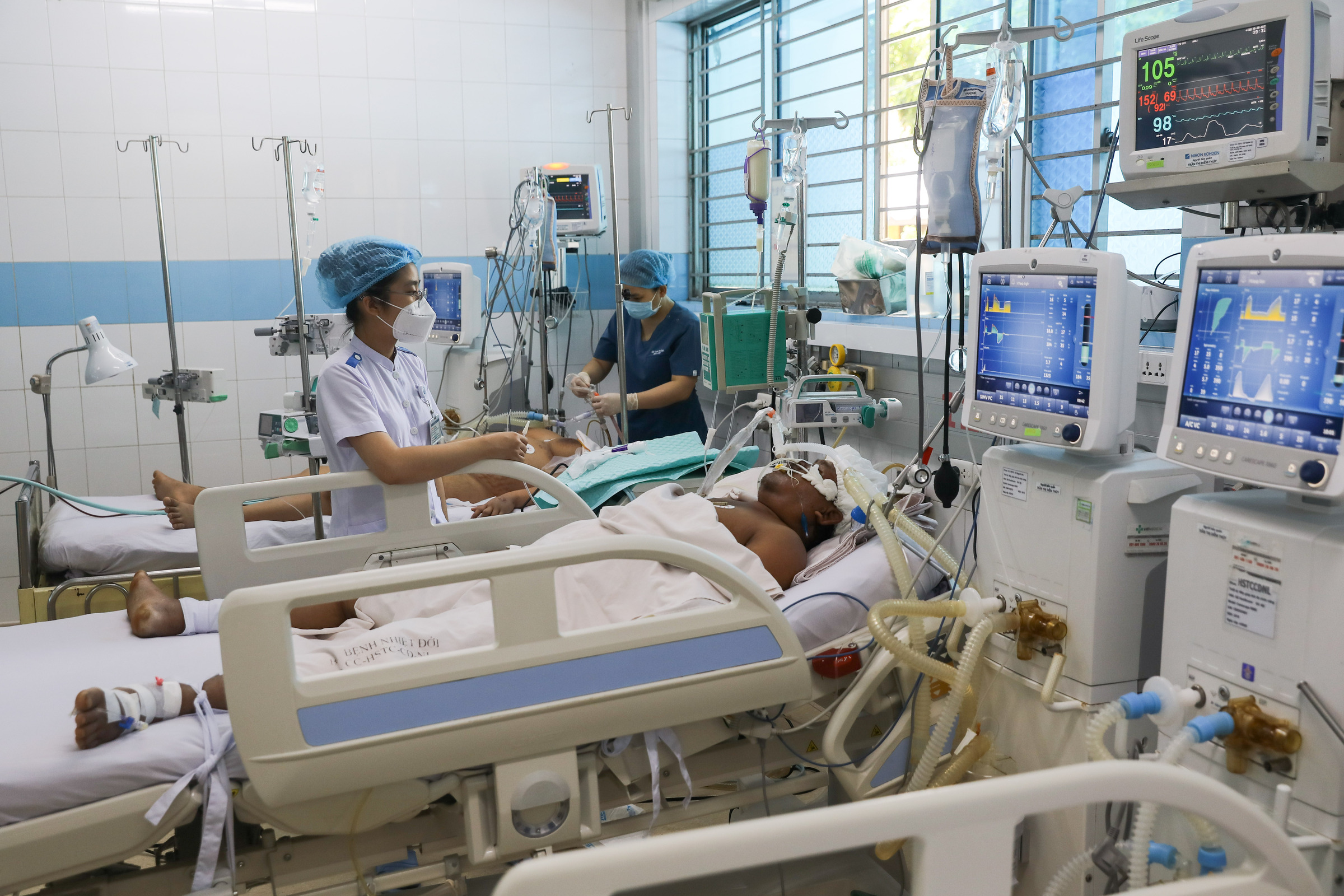Dr. Nguyen Van Vinh Chau, deputy director of the Ho Chi Minh City Department of Health, stated that among the three diseases, dengue fever is the most common and prevalent year-round. Chikungunya has also been present in Vietnam for a long time, according to published molecular epidemiology and serological studies. Zika circulates at low levels but has not been eradicated. The risk remains, particularly for pregnant women. All three diseases are primarily transmitted by the Aedes aegypti and Aedes albopictus mosquitoes.
According to Dr. Chau, after the global Zika virus outbreak in late 2016, Ho Chi Minh City has maintained surveillance sites for both Zika and Chikungunya. No new cases have been detected in recent years, but the risk of emergence remains. The city maintains a disease surveillance system to proactively respond to any potential situation.
 |
Dengue fever treatment at the Ho Chi Minh City Hospital for Tropical Diseases. Photo: Quynh Tran |
Dengue fever treatment at the Ho Chi Minh City Hospital for Tropical Diseases. Photo: Quynh Tran
These diseases share similar initial symptoms, including fever, muscle pain, rash, and fatigue, making early clinical diagnosis difficult and requiring laboratory testing. Currently, there are no specific treatments for any of the three diseases, primarily focusing on supportive care and symptom management.
Dengue fever poses a higher risk of severe progression, especially in individuals with reinfection, underlying conditions like diabetes, high blood pressure, chronic liver or kidney disease, being overweight or obese, or during pregnancy. Prominent symptoms include high fever, headache, retro-orbital pain, muscle pain, nausea, rash, and skin hemorrhages. Patients are at risk of shock, severe bleeding, multiple organ failure, and death if not treated promptly.
Chikungunya is transmitted when a female Aedes mosquito bites an infected person and then transmits the pathogen to a healthy person. After being bitten by an infected mosquito, individuals experience an incubation period of 3 to 7 days before developing symptoms such as sudden high fever, severe joint pain (especially in the hands and feet), rash, muscle pain, headache, and fatigue.
The disease is mostly benign and self-limiting, resolving within a few days to weeks. However, joint pain can persist for months or even years in some cases. Severe complications are rare, and most patients recover fully. Fatalities from Chikungunya are very uncommon, typically occurring in individuals with weakened immune systems, such as infants, the elderly, or those with underlying health conditions.
Zika virus disease often presents with mild clinical manifestations or is asymptomatic. Common symptoms include rash, fever, conjunctivitis, headache, muscle pain, and joint pain. Zika can have severe consequences if contracted during the first trimester of pregnancy due to the risk of microcephaly in the fetus. Unlike the other two diseases, Zika can be transmitted through sexual contact. After exposure, the virus can persist in the blood for up to 14 days, in urine for 30 days, and in semen for up to 6 months. Therefore, sexual contact should be avoided with infected individuals, those carrying the virus, or those who have recovered from the disease for at least 6 months from the date of infection.
The Oxford University Clinical Research Unit (OUCRU), in collaboration with the Ho Chi Minh City Hospital for Tropical Diseases, collected blood samples within 72 hours of fever onset from over 8,100 children aged 1 to 15 at 7 hospitals in southern Vietnam from 10/2010 to 12/2014. Results revealed over 2,200 dengue fever cases (27%), only 4 Chikungunya cases, and 2 Zika cases.
According to Dr. Chau, the most effective preventive measures are avoiding mosquito bites and eliminating mosquito breeding sites. People should sleep under mosquito nets, wear long-sleeved clothing, and use mosquito repellent, especially during the day. Eliminate stagnant water containers, where mosquitoes breed, such as bottles, old tires, gutters, and jars. Change the water in flower vases and plant pots at least once a week and cover water storage containers. Cooperate with authorities and health agencies in mosquito control campaigns and spraying.
For dengue fever, a vaccine has been approved in Vietnam, effective against all 4 dengue virus types, for individuals aged 4 to 60, without the need for prior blood tests. If symptoms such as fever, joint pain, or rash develop after returning from an affected area or if infection is suspected, seek immediate medical attention for diagnosis and treatment.
Le Phuong












